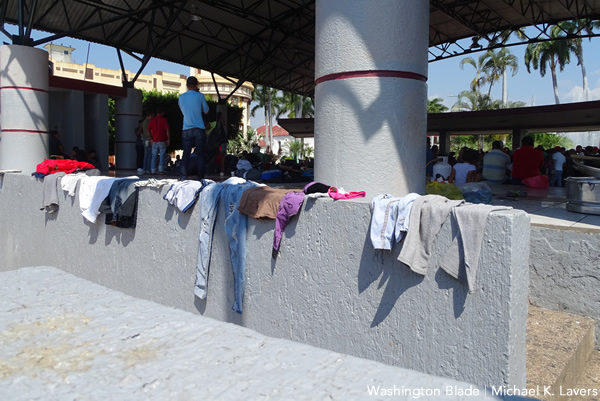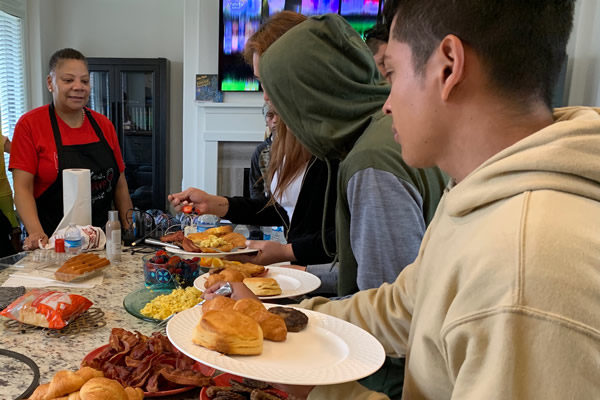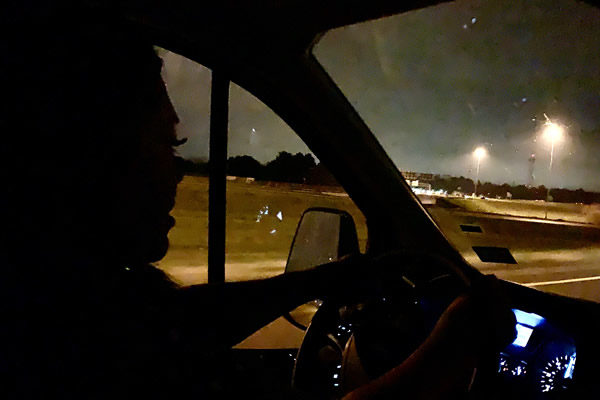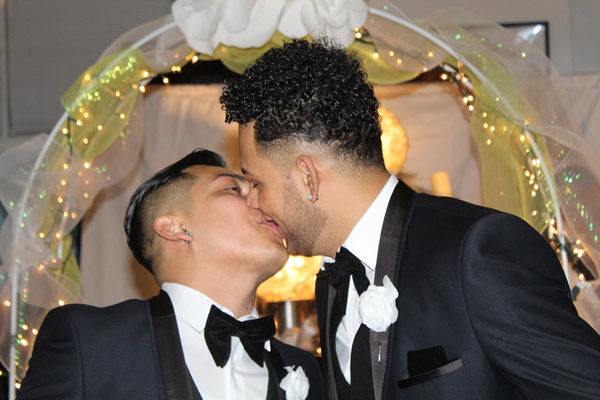Alex and Felipe: Migrants’ Desperate Journey Ends in Love
Alexander and Felipe are gay immigrants from Nicaragua and El Salvador living in D.C. Their home is one bedroom festooned with Barbie dolls, rainbow flags and their national flags. How they made it to this small brick rowhouse off of Georgia Avenue, N.W., is a journey fueled by violence, fear, desperation and ultimately love.
In early 2018, the young men left their respective homelands because of homophobic violence. Alexander, who owned a successful fried food kiosk called a fritanga in his hometown of Ayapal, Nicaragua, was forced to flee because he says neither his parents or siblings accepted his homosexuality. The neighbors in his small community were equally intolerant.
“I was threatened with machetes and knives,” he recalls. Alexander says he abandoned his home, business and country because “I thought they were going to kill me.”
Felipe’s story is similar, with the added twist of gang or mara violence that is the “daily bread” of many Salvadorans, especially those living in his hometown of Sonsonate.
“You live in constant fear,” he says. “More so when you are part of … ”
He pauses and says quietly “… the gay community.” It’s almost as if proclaiming his sexuality out loud could still cause his death.
Each youth left on their own and headed north. Their only companions on the road were hardships.
“I had to sleep on the side of the road and in parks. I endured heat, cold, hunger and thirst,” says Alexander. For Felipe, leaving El Salvador was equally tough.
“I placed myself in God’s hand and in his will,” he says softly.
They say their trip to Mexico was fraught with danger. Cartels and criminal gangs are everywhere and immigrants are easy prey.
“They see Central Americans as merchandise,” says Alexander. “If they catch us they kidnap you and hold you for ransom. If you can’t pay, they kill you.”
The youth met in Tapachula, Mexico, near the country’s border with Guatemala and became friends. Unable to find work or get asylum in Mexico, they soon joined one of the caravans of Central American migrants trekking norte to the U.S. border. They faced the same homophobia in the caravan that had forced them to flee their homes.
“They mocked us, threw rocks at us,” recalls Alexander.

The couple sought safety in numbers and joined a group of several dozen other LGBTQ youth who were part of the caravan. They hoped that banding together would spare them from even worse homophobic violence from within the caravan.
By the time the ragged group arrived at the Mexico-U.S. border they were exhausted, had run out of money and were still at risk of being kidnapped by the cartels or attacked by homophobes. Alexander, Felipe and the others say they were unnerved by the chaos of thousands of migrants waiting their turn on the bridge and living in camp cities on the border.
Felipe says they feared the Trump administration would soon close the border, which it would do a few months later. The group made a fateful choice.
“We decided we would all try to swim across or die trying,” says Felipe.
The youth on Feb. 23 jumped in the Rio Grande as a group but Felipe, who can’t swim, soon began to struggle in the murky waters.
“About halfway through I started to drown,” he says.
Alexander saw this and returned from the American side of the river and rescued Felipe.
“I told him to hold on to my neck and that I would get him across,” says Alexander.
Border Patrol agents arrested the 15 soaking wet youth but were at a loss with what to do with such a large LGBTQ group of detainees. They were shuttled from one detention center to another in a space of three days.
“No one wanted us, we were rejected everywhere, one day here, then somewhere else, another place,” says Felipe.
Homeland Security contacted Ruby Corado, a transgender activist and Salvadoran-American immigrant who runs Casa Ruby in D.C., and asked her to sponsor them. She didn’t hesitate.
“I understand very well the dangers of being in detention centers, many of them die, some of them are very sick,” says Ruby.
Ruby flew to San Antonio where she took custody of Alexander, Felipe and the other 13 youth on Feb. 28. She bought food, loaded the immigrants into a van and began a 1,600-mile trek to D.C.
At least 24 immigrants have died in U.S. Immigration and Customs Enforcement custody since the Trump administration began, including seven children and two trans women. Scores of others have complained of physical and sexual abuse while in ICE custody.
Ruby tapped into her contacts within welcoming congregations across the country and arranged support for her small caravan, explaining what was at stake.
“I knew somewhere down the line we were going to save lives,” says Ruby.
The shell-shocked youth, who hours before were shivering in an immigration cell were now being driven across the country and being warmly welcomed at multiple stops, including Houston and Atlanta, where congregations cared for them physically, emotionally and spiritually. For many of these southern congregations, headed by African-American pastors, it was an opportunity to validate their all-embracing vision of Christ’s teachings.
“God told me to love and I show my love for God by serving God’s people,” said Pastor Marvetta Walker of Progressive Open Door Christian Center in Houston while she laid out steaming platters of eggs and bacon along with smiles and hugs in her home. It was also an opportunity for these congregations to re-enact a seminal moment in the plight of enslaved Africans’ own journey to a promised land.
“We all answered the call, so that we could be here and be a part of this underground railroad, to get these wonderful beautiful souls to Washington, D.C. to really experience the freedom that we have,” said Dr. Elijah Nicholas, pastor of Kingdom International Ministries in Atlanta. “This is what America is about.”

At one point towards the end of the journey, Ruby started playing Spanish ballads from Mexican torch-singers, the kind of sad songs usually heard at drag shows in Central America. Ruby began bellowing out the words to “A Prueba de Todo” which means “Able to Withstand Anything.” Her bellowing rendition was off-key but with drama to spare, and soon one-by-one the youth started to sing as well. It was a “Priscilla Queen of the Desert” moment as the van made its way through the darkened interstate. It seemed the words of resilience and love were triggering a cathartic group experience.
“At first, I didn’t believe any of this was real, but by the time we were driving in the van towards Washington and singing I started to hope that maybe my life might get better,” said Felipe.

Three days later, they arrived at Casa Ruby at 3 a.m. where the exhausted youth were lovingly welcomed by staff, volunteers and clients.
In the past year; Alexander, Felipe and the others enrolled in English classes and secured pro-bono attorneys for their asylum cases. They’ve shared their stories with federal, state and local lawmakers and with LGBTQ activists from places as far away as Israel.
“It was so nice so beautiful that people from so far away wanted to share time with us, wanted to know about us,” says Felipe.
“I feel good, I feel at peace, I feel happy in a free country,” adds Alexander.
Alexander and Felipe are living in a free country where they were able to do something they never imagined in their wildest dreams: Get married, and on Dec. 6 they did just that at Casa Ruby with Larry Villegas as their officiant.
